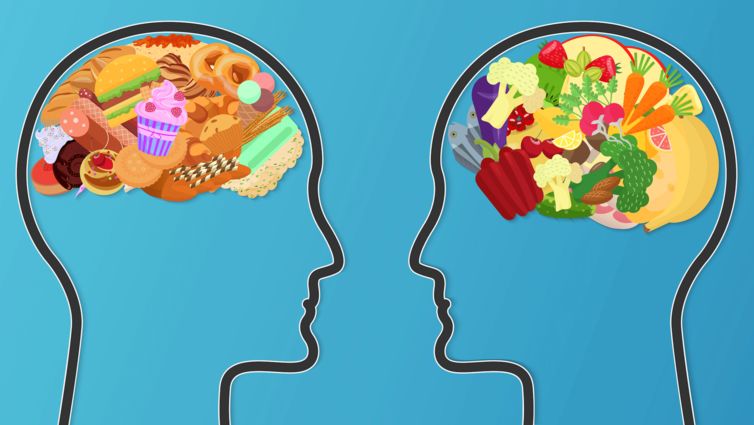
Are you noticing yourself reaching for more cake and wine than usual? Last night Anne (the other half of BrainSmart) found herself in a battle with an ice cream! She won in the end and didn’t eat it, but it was a classic battle of willpower. Her rational brain knew that consuming sugar is not the right way to support her immune system at this critical time, but it was also saying that it had been a stressful week, the urge was strong and the willpower weak.
Our brains can run out of willpower, it’s a precious resource and we are using a lot of it now to inhibit, stop or change behaviours that have been natural to us for so long. For example, we walk close to someone then we remember that we have to move away for social distancing, we use a shopping trolley and then have to remind ourselves to wash and sanitise our hands. All these actions are requiring us to stop our habitual way of doing something and to do something different which can be exhausting for our brain.
By the end of the day, our reserves of willpower can be so depleted that we end up reaching for the ice cream, the wine or the high fat carbs and then often feel guilty and frustrated afterwards.
Now that we know this is normal, is it going to get easier? It will still be difficult to make the healthier choices when our willpower is depleted, but we can plan for moments of weakness and make it easier to choose wisely.
We can indulge our desires with a smaller amount of what we crave, or choose to have an alternative option readily available that is healthier for us. We can even remove temptation altogether, but we also need to remember to be kind to ourselves too and practise some self-compassion. Anne replaced ice cream with coconut yoghurt and fruit; she didn’t feel guilty, was still kind to herself and won an inner battle which felt great as she was back in control!
Let’s look at some foods that feed our brain for resilience by boosting our immune system, helping against depression and anxiety and keeping the part of our brain healthy that is responsible for willpower, part of our Prefrontal Cortex (ventrolateral prefrontal cortex for the science buffs). We also have 100% control over adding these to our diet.
1) Blueberries – produce a type of phytonutrient called flavonoids, that research has shown may be effective against depression.
2) Spinach and other Dark Leafy Greens – provide magnesium, that have been show to be important in reducing anxiety and are rich in B vitamins, that are crucial for healthy moods.
3) Vitamin D/Sunshine – vitamin D from being in the sun. Around 40 to 60% of all adults may be severely deficient in vitamin D, making it the top nutrient deficiency in the world. Sit in the sun (or in the fresh air if there is no sun) for 10 minutes every day to maximise Vitamin D3, as a deficiency will increase susceptibility to infection.
4) Vitamin C-Rich Foods – our bodies can’t make or store vitamin C, so it must be added into our diet. Vitamin C is essential for our bodies to produce dopamine and serotonin, neurotransmitters that are key to fighting depression and stabilising mood. Guavas, sweet peppers, kiwi, strawberries, oranges, papaya, broccoli and tomatoes are some of the highest vitamin C foods around.
5) Brazil nuts – all nuts are great for mood, Brazil nuts perhaps especially so. They are high in anxiety-fighting magnesium and are one of the richest sources of selenium, which research has shown can be effective for helping with depression.
6) Chocolate – yes, you read correctly! Research shows the unique antioxidants found in dark chocolate may help in a big way with reducing cortisol and other ‘stress hormones’. Try to opt for the highest cocoa/cacao options.
7) Salmon – provides a high amount of Omega-3 fats which, in addition to their heart benefits, are important for fighting depression. Salmon is also rich in selenium and the B vitamins and as foods go, one of the highest in vitamin D too.
8) Green Tea – good for many reasons including providing a natural mood-booster, L-theanine. This amino acid has been shown to help fight anxiety.
9) Pumpkin, Squash, Chia Seeds – these are all high in tryptophan, an amino acid that is key to reducing anxiety and depression. Chia seeds are also high in magnesium and Omega-3s which have been shown to fight depression.
10) Lentils – lentils are legumes and can be good for mood, but lentils have the added benefit of containing more folate than any other common plant-based food. Folate is a B vitamin involved in healthy nerve function and research shows deficiency in it may be associated with depression. Lentils are also very high in potassium and iron which help fight fatigue.
STAY HYDRATED – last but not least – DRINK WATER and lots of it, at least 7-8 cups a day. This keeps your mucus membranes moist and more resistant to infection and becomes even more important if you do become unwell. Your body is healthy only if you are hydrated.
It looks like we’re in this new normal for the long haul and we owe it to our bodies and brains to be kind to them, to feed them in a way that will boost our immune system and build a healthy protection against anxiety and depression.
As with any new habit – choose just one or two to focus on first and changing too much at once can set us up to fail.
Please let us know how you go.
Anne and Clare
Leave a Reply